Trudy J. Morgan-Cole's Blog, page 9
October 7, 2024
What Strange Paradise, by Omar El Akkad
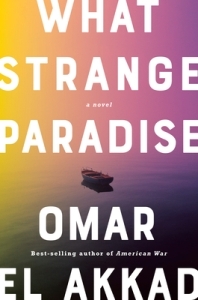
This Giller-prize-winning, Canada-Reads-nominated 2021 novel opens with an image that still haunts many of us in memory: a small boy lying facedown on a beach in Turkey, dead after the sinking of a migrant boat that was trying to reach the Greek island of Kos. This is not a novel about two-year-old Alan Kurdi, whose death in 2015 was captured in images shared around the globe. But in another way, it is — because it is about all migrants, especially migrant children, and about this moment in history where we find ourselves.
The boy on the beach in What Strange Paradise is nine-year-old Amir Utu, whose family fled the war in Syria for Egypt. Amir follows his uncle onto a crowded boat that, though Amir doesn’t know it, is headed for a Greek island in hopes of finding a safe haven and a stepping stone to Europe. Unlike Alan Kurdi, Amir survives — but doesn’t find safety. On the island, a tourist-driven economy is being disrupted by the waves of refugees landing on their shores — and empathy is in short supply. When Amir meets a local teenager, Vanna, the two try to evade the soldiers who want to make sure all migrant arrivals are captured, processed, and detained in a camp.
The novel’s timeline moves back and forth between Amir and Vanna on the island, and the backstory of the voyage that led Amir there. Although the reader empathizes with Amir and wants him to find safety, this is not a simple story of black and white, good and evil (though there is plenty of evil at play). Rather, it is a novel about the complex web of motivations that lead people to become refugees, to exploit refugees, to control refugees — everyone in this story has mixed motives, except perhaps Amir himself.
The book ends with a memorable twist that is open to many different interpretations, and might change your perspective on what you’ve read in the preceding chapters. However you interpret it, this remains a heartbreaking story of the lengths people will go to to find safety, and how slim the chances are that they will actually find it.
The migrant crisis hasn’t been in headlines like it was in 2015 when Alan Kurdi died on that beach, but it hasn’t gone away, and as attitudes towards “the other” harden in many wealthy countries, decisions about how we deal with the mass movement of desperate people in search of new homes become more urgent than ever. This novel is a powerful voice to add to that conversation.
October 3, 2024
The Ministry of Time, by Kaliane Bradley
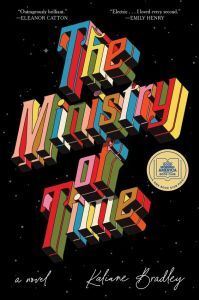
This is one of the best books I’ve read this year — immediately engaging, hard to put down, wrestling with big ideas in a compelling way. And it’s a book with heart, too: one that absolutely does not guarantee a happy ending, but does leave the reader (this reader, anyway) with a full heart.
What drew me in, of course, is that it’s a time-travel story. The first-person narrator, whose name we never learn (a device I usually hate, but it works here, trust me) is a young woman working in the UK civil service, who gets recruited into a top-secret program working with time-travellers who have been brought from various points in the past, to the present day. The narrator, whose mother was a refugee from Cambodia and whose father is English, finds points she can relate to in the experience of these refugees of history – a sense of not quite belonging in the world, of other people’s expectations not fully aligning with her self-perception.
The handful of people brought through the “time door” that the Ministry of Time appears to have either created or discovered, are all taken from crisis points in history just before their recorded deaths. The narrator is assigned as handler to Graham Gore, a member of the doomed Franklin polar expedition of the mid-1800s. From a handful of facts about the historical Gore and a single daguerrotype picture, Bradley has created a gentle, humorous, unperturbable man so real he practically walks off the page. His mix of bewilderment and curiosity about the modern world feels absolutely right, and in their odd and often funny partnership, he finds his way into the reader’s affection as surely as he does in the narrator’s.
The first two thirds of the novel are slow-paced and quiet, with the focus staying on the two main characters and the growing friendship between them — as well as some great minor characters, some of whom are also time travellers. There’s a growing mystery about what is actually going on with this time-travel program, whether someone is trying to sabotage it, what’s the real purpose behind it all — but all this remains in the background until the last third of the novel, when the pace suddenly picks up. In those last chapters the book is much more of a thriller, but it never loses its heart, its focus on the characters, and its ability to ask big, difficult questions — and at least hint at answers.
Can time travel change history? This novel’s answer to that question is one that will linger with me for a long time.
October 2, 2024
We Rip the World Apart, by Charlene Carr
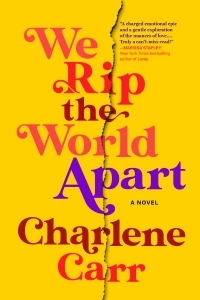
This was a lovely, engaging, thought-provoking book which I read in a single sunny day earlier in the summer. It’s a multi-generational family saga about racism, parenting, the fierce love and inexplicable wounds between parents and children. There’s a present-day story of a young Canadian woman of mixed race struggling with her heritage as she questions her place in the Black Lives Matter protest movements that so many of her friends are becoming involved with, interspersed with the story of her parents’ interracial marriage and the unhealed wounds that have left such a rift in their family. This novel is deceptively light and easy to read while probing deep and thoughtful issues with care and insight.
Do You Remember Being Born? by Sean Michaels
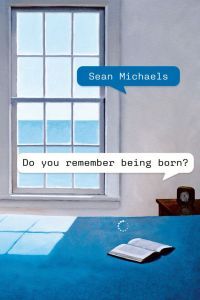
This is a novel that was described to me as “literary sci-fi,” though I’d say there’s a much stronger emphasis on the literary than on the sci-fi. The futuristic/sci-fi element is that a famous American poet is hired for a large sum of money (an astronomical sum, to a poet) by a nameless but very huge company, to write a poem in collaboration with its AI poetry-writing software. The poem will be released to great fanfare to promote the company’s work in AI, and the poet, who has personal reasons for wanting a large chunk of cash, will gladly take the money.
This is one book where I regretted my usual decision to read it as an e-book, because in the printed book, there is apparently a textual way to distinguish between the contributions of the human writer and the AI in the poem they work on together, as well as in their online conversations, but this was not distinguished in any way in the text of the e-book, which made it hard to follow.
The poet, Marian Ffarmer, is loosely based on Marianne Moore; some of Ffarmer’s line in the book are actually from Moore’s poems, and the poetry AI program that Sean Michael’s used to create the lines the AI writes in the novel, was trained largely on Moore’s work, so it’s not surprising that it produced a passable pastiche of her writing style. For a writer and avid reader, I’m pretty bad at evaluating whether a particular piece of poetry is “good” or not — I know what moves me, what lines linger with me, but wouldn’t feel confident to say “this is a great poem,” and so was not sure how I was supposed to be reacting to the AI-written poetry in this novel. Is the AI (who is given the name “Charlotte” in the novel) actually any good? The implication is, not very, but I’m not sure I would have reached that conclusion on my own.
I found the human story of the book much more interesting — Ffarmer as a character, the way her life unfolds in backstory, particularly her struggle between being a wife/mother and being a poet, and the choices she eventually makes. The comparison to Moore is interesting here because although the fictional Ffarmer’s poetry echoes Moore’s, her biography, in most ways, does not. Also relevant, perhaps, is the fact that Marianne Moore lived from 1887-1971; assuming Do You Remember Being Born? is set in the present or very near future, Ffarmer, who is 75 when the story takes place, must have been born around 1950, which places her in a very different generation — in literary and in sociological terms. Could there even be a “famous poet” in the style of Marianne Moore, in the last quarter of the 20th century and the first quarter of the 21st? She could dress (as Ffarmer does) in the same striking tricorne hat and exhibit some of the same eccentricities, but she would be living and writing in a very different world, with different choices to make.
As for Ffarmer’s “collaboration” with Charlotte the AI, it led to some interesting questions about literature, language, humanity and the creative process — but one thing I missed was any sort of questioning about the ethics of a writer essentially training artificial intelligence to mimic human creativity. Not that that question is absent from the story — in many ways, it underpins the whole story, though Michaels himself is clearly comfortable with this kind of of experimentation, since he used it to write the book — but it was surprising to me that Ffarmer herself doesn’t spend much time wrestling with this, focusing rather on the logistics of how a human and a machine mind work together, and whether the result can be said to be truly an act of creation.
The Hotel Avocado, by Bob Mortimer
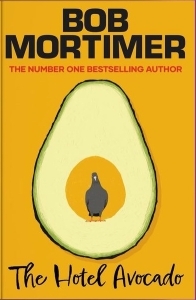
The Hotel Avocado is the sequel to Bob Mortimer’s The Satsuma Complex, and is just as enjoyable with the same caveat — if you don’t know/don’t like Mortimer’s style of humour, this novel might not work for you — but if you do, it almost certainly will. The novel picks up soon after the events of the previous book — Gary and his girlfriend Emily are still together romantically, but separated geographically as she has moved to Brighton to operate the hotel her father left her, while Gary remains in South London doing legal work and unable to commit to making the move to Brighton to be with Emily. The plot seesaws between Emily’s attempts to successfully open the hotel (complete with giant decorative outside avocado, which requires city planning permission), and Gary dealing with the aftermath of the last book’s plot, in which some rather unsavory characters are very anxious to make sure he doesn’t testify in the resulting court trial. As a thriller, this is probably a little loose and uneven, but I’m not reading it for the taut suspense — I’m reading it for the wacky humour, as well as the fact that several of the chapters are narrated by a pigeon.
“Caesar’s Soldier” and “Caesar’s General,” by Alex Gough
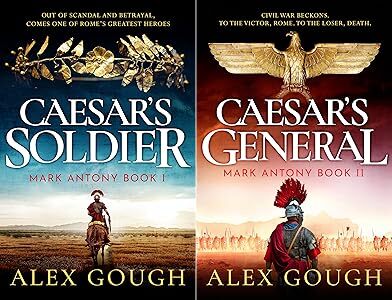
It’s nice to pick up some fresh, interesting historical fiction about a character who has always interested me. I’ve been wanting a good Mark Antony novel for years, and these two books have definitely addressed that wish! (I’m assuming they’re the first two of a trilogy and there’s something like Caesar’s Avenger or something coming to complete it, since Caesar’s General ends with the assassination of Julius Caesar).
As the titles suggest, these books are very much focused on Antony’s military career and have a lot of battle scenes — which is fair, that was the main thing the man did with his life and certainly what he was seen as being best at. If I’d have liked a little more focus on his political and his personal life — especially his marriage to Fulvia, who absolutely deserves her own historical novel and I can’t believe I’ve never been able to find one!! — that’s just a classic case of a writer writing the book they wanted to write, not necessarily the specific one I wanted to read. Despite that, these are two enjoyable, highly readable books about Antony, and I will definitely be first in line to read a third book if and when it comes out.
September 30, 2024
“Cecily” and “The King’s Mother,” by Annie Garthwaite
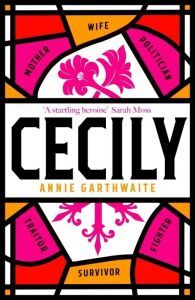
Cecily and its sequel, The King’s Mother, are two stellar examples of the very best of historical fiction, which I could not put down once I started. This is another take on the Wars of the Roses, seen through the eyes of one of the most central and yet enigmatic female characters, Cecily Neville, Duchess of York. Wife of Richard of York, who might have been king, and mother of two English kings — Edward IV and Richard III — she has been depicted in various tellings of their stories, but always on the edges, rarely at the centre as she is here. I’ve read a lot of novels about the Wars of the Roses, and one exception to that rule is Anne Easter Smith’s novel Queen by Right, which does focus on Cecily as the main character. While I enjoyed that novel when I read it many years ago, it doesn’t stand out in my mind the way I suspect these two books will.
We often hear that before the 20th century, most women who exercised power had to do it by being “the power behind the throne” — working with, through, and around men. In the case of dynasties, the men involved were often their husbands and sons, and though Cecily Neville was the first English woman to use “The King’s Mother” as a official title, stories from all around the globe remind us that being the mother of a king or an heir to the throne can be a powerful position for a woman. These two novels show just how a woman like Cecily Neville could exercise that kind of power — as well as that power’s limitations.
A Safe Girl to Love, by Casey Plett
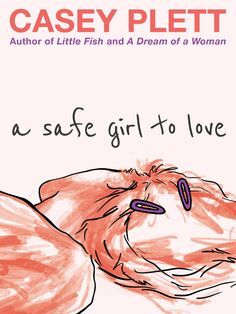
Despite my well-established preference for novels over short stories, I think I enjoyed this collection more than I enjoyed Plett’s novel Little Fish, even though one of the stories I liked most was one of the longest and and also one that bore the most similarities to Little Fish (even when reading a short story collection, I’m always in search of that novel experience that will completely immerse me in the characters and their world). Plett writes in this collection, as she does in Little Fish, about the lives of young transgender women; there’s a variety of experience here, as well as of story styles, that I found more satisfying than the rather limited perspective of Wendy’s life in Little Fish. Also, there is one short story in this collection (the one about the cat, if you’ve read it) that absolutely tore at my heart and will probably haunt my memory forever. And any collection that can deliver one story like that, is a great read as far as I’m concerned.
September 26, 2024
The Hunter, by Tana French
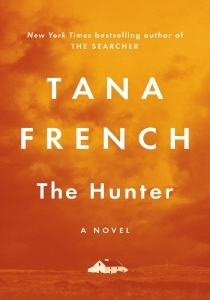
The Hunter is the sequel to French’s The Searcher, which I read and enjoyed very much. In this sequel, fish-out-of-water Cal, the American ex-cop who’s moved to an Irish village for a quiet life, once again gets embroiled in the complex web of relationships that define village life. This is not a “mystery” in the traditional whodunit sense, but there is crime, suspense, and (eventually) a suspicious death. The suspense keeps the pages turning but the real delight here is the character development and the relationships among the characters that keep Cal from falling into the “bitter, cynical, lonely detective” trope. If this is going to be a continuing series, I will go on reading it!
September 25, 2024
Slow Dance, by Rainbow Rowell
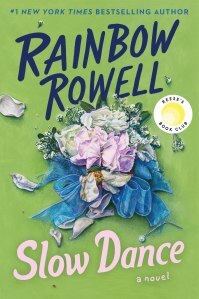
I found Slow Dance to be a fun and extremely readable novel about a couple of high-school friends, Shiloh and Cary, who meet up again at a mutual friend’s wedding. Shiloh and Cary never dated in high school, had a close brush with romance when Shiloh was in college and Cary was in the neighbour, and then grew apart after some painful misunderstandings. Now both single again, they are finding their way slowly back to each other, but real life in adulthood is full of complexities – Shiloh has two young kids and is sharing custody with her ex-husband; Cary is still in the navy but visiting their hometown to help his disabled mother, who is living in poverty while still being responsible for lots of other, needier family members. I really enjoyed how believable this depiction of romance amid the complications of family, friends, and memories was.



